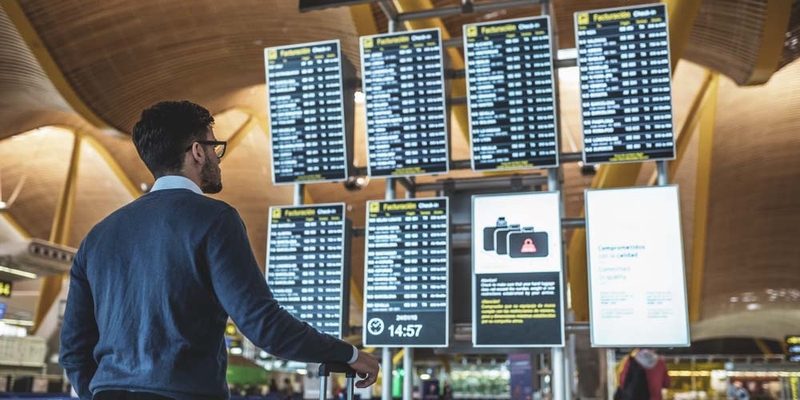
If you are not redirected within 30 seconds, please click here to continue.
Samedi: 10h – 16h HAE

If you are not redirected within 30 seconds, please click here to continue.
If you are not redirected within 30 seconds, please click here to continue.
How a war or conflict advisory can impact your travel insurance

Most governments strongly advise against travelling to countries with active war zones due to the threat of extreme violence and unreliable access to aid in these areas. However, the political climate in countries can shift rapidly, and you could already be abroad when circumstances change.
For instance, the Russian invasion of Ukraine began abruptly on February 24, 2022, initiating a months-long attack on the nation. Many Canadians fled across neighbouring borders, and those who couldn’t escape were advised to seek shelter. Both countries now have a level four travel advisory: avoid all travel.
“The Government of Canada recommends that Canadians avoid all travel to war and conflict zones,” Jason Kung, a spokesperson for Global Affairs Canada, told RATESDOTCA in an email. “The Government of Canada cannot guarantee Canadians’ safety and security abroad and its ability to provide consular assistance in conflict zones is often extremely limited.”
If such an event were to occur when you’re travelling, your travel insurance coverage could help you return home early and recuperate non-refundable costs. Whereas travelling against the recommendations in a travel advisory could leave you without coverage.
Canadian travel advisory risk levels
The Government of Canada issues travel advice to help Canadians make informed decisions about their destinations.
“We closely monitor safety and security conditions abroad, 24 hours a day, seven days a week, using a wide array of information sources,” says Kung. “Travel Advice and Advisories are updated promptly to respond to events that may affect the personal safety and security of Canadians abroad.”
The travel health notice risk levels include:
- Level one — practise health precautions: A level one advisory, the lowest tier on the notice list, reminds travellers to take standard security precautions, such as being up to date on all recommended vaccinations.
- Level two — practise enhanced health precautions: A level two advisory reminds travellers to take enhanced safety precautions, such as getting additional vaccinations or avoiding high-risk activities.
- Level three — avoid non-essential travel: A level three advisory indicates a high risk to travellers’ health, and guidelines usually accompany this notice to reduce risk. You might recognize this advisory as it was used during the height of the COVID-19 pandemic.
- Level four — avoid all travel: A level four advisory, the highest tier on the notice list, indicates a high risk to travellers’ health and well-being. It’s recommended travellers do not travel to destinations with this advisory for any reason.
Many destinations have more than one advisory in place at a given time. For example, due to civil unrest, Ethiopia is currently under a level three advisory. However, several regions within the country are under a level four advisory due to armed violence and the risk of terrorism.
“The decision to issue, remove, upgrade or downgrade an advisory is made in consultation with the embassy, high commission or consulate of Canada responsible for the destination, as well as with stakeholders from various divisions at Global Affairs Canada,” says Kung. “There is no strict formula to determine the level of a country or region. The level is based on an overall assessment of the current security situation.”
You may find it challenging to get travel insurance coverage if you intend to go to a destination within the top two risk levels. For this reason, travellers should verify their trip itinerary at least twice: when planning and before departing.
If you are overseas when an advisory is issued, however, follow these steps from Global Affairs Canada:
- Check the Travel Advice and Advisories page or download the Travel Smart mobile app for the latest information on your destination and follow the recommendations provided.
- As per the language in the travel advisory, plan to leave the country.
- Comply with all local laws and follow the instructions from local authorities.
How specific travel advisories influence travel insurance coverage
“We also encourage Canadians planning to travel outside Canada — even for a day in the United States — to buy travel health insurance before they leave,” says Kung. “The insurance policy should cover medical evacuation, pre-existing medical conditions and repatriation in case of death. In addition, [Canadians] should make sure they get insurance for trip cancellation, trip interruption, lost luggage and document replacement.”
Often, people choose to purchase a plan that protects their potential medical needs and finances. Here’s how travel advisories affect the different kinds of travel insurance coverage you can buy.
Trip cancellation
Say you’ve booked a trip, and just before you depart, a conflict breaks out at your intended destination. As a result, a travel advisory goes up in one of the top two categories: avoid all non-essential travel or avoid all travel.
“That’s when your travel insurance policy would kick in,” says Will McAleer, executive director for the Travel Health Insurance Association of Canada (THIA). “You’d be able to claim for the non-refundable portions of your trip under your trip cancellation policy.”
Trip interruption
Perhaps, you’re already abroad, and a level four advisory has been issued due to signs of discord with government leaders. In this case, your trip interruption policy will take effect instead.
“You can get coverage for things like having to return home early, [and] any portion of your vacation, for instance, that you might have missed as a result of having to leave early,” says McAleer. This includes eligible excursions, tours, and hotel stays.
Emergency medical term
Once a top-level travel advisory is issued, some insurance providers will give you a specific number of days to get back home while you have emergency medical term coverage before it ends. Other policies will allow for a continuation of coverage.
Since it varies by policy, McAleer recommends calling “the toll-free number associated with [the policy], and the insurers or the distributors will certainly answer those questions.”
Before the COVID-19 pandemic, it was more common for travellers to lose their coverage if they chose to stay in a location once an advisory went up. However, insurance providers responded after the government issued a global travel advisory to avoid non-essential travel abroad in March 2020.
“It wasn’t just specific countries at the time; it was every country,” says McAleer. He explains that after realizing individuals could and needed to travel, many insurance providers revised policies to include some COVID-19 care regardless of the advisory, which was eventually lifted after more than one year.
Still, travellers should read their policies carefully to understand what is included. In many cases, the costs of quarantining are not covered. While many insurance policies have come to include provisions for the COVID-19 virus and its variants, the hazards of conflict zones are far more complex.
“For the average leisure plan, insurers have little appetite for that type of risk,” says McAleer. He refers to countries such as North Korea and Ukraine. “A place like that is simply not something that’s going to be covered.”
Prepare for the unexpected when travelling abroad
Globally, there have been many changes over the last two years. That’s why it is essential to research your destination thoroughly. Look for details, such as political stability or economic changes. Things like this can lead to higher crime rates.
“Oftentimes, resources are available to help you understand what it’s like on the ground before you go,” says McAleer. “Some assistance companies will put risk grading tools on their websites so that travellers can understand the relative risk and things like COVID entry requirements, currency issues, and crime levels — but again, it will vary from insurer to insurer.”
Most importantly, purchase travel insurance coverage to protect against the unexpected. It can save you hundreds, if not thousands, of dollars should you need medical assistance abroad or if you need to come home early due to a conflict advisory or other eligible unforeseen reason.
Don't waste time calling around for travel insurance
Use RATESDOTCA to shop around, and compare multiple quotes at the same time.
Finding the best travel insurance coverage has never been so easy!
Get money-saving tips in your inbox.
Stay on top of personal finance tips from our money experts!










